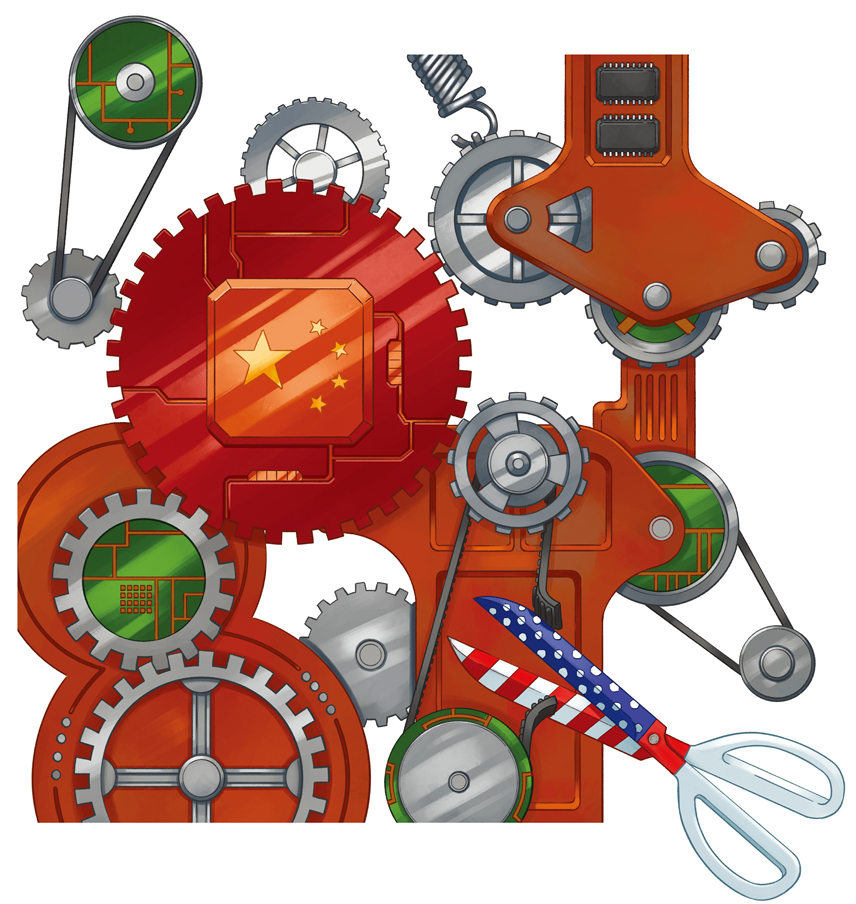Centuries ago, China was known as a greater inventor, famous for the Big Four inventions: the compass, gunpowder, papermaking and printing. But today, technology breakthroughs like that can barely be seen anywhere except in the history books, and ‘Made in China’ has often come to stand for mass-produced, cheap and commoditized.
But can China produce game-changing innovations again? We posed that question to tech buff Tom Standage, Digital Editor of The Economist. According to Standage, “China’s ability to innovate is massively underrated, particularly in America.” He feels that in many ways the developing world will come up with new monumental inventions and the world will move to a model of innovation that comes from cross-border collaborations, rather than from a particular country.
Excepts from a two-part interview (you can see Part 1 in which Standage talks about the top technology trends like 3D printing, driverless cars and low-cost genomics here):
Q. When we look at the developed world, that’s operating in a very different scheme of things, and then you have emerging economies that operate in a set of constraints. The reality in China, India or Africa is very different than what it is in Europe and the US, which may give rise of interesting innovations. For example, mobile payments, one of the things you often highlight, in your fuller list of technology trends to watch out for. That has seen greater–and early–adoption in developing world countries such as several East African nations. What do you think will be the role of emerging and developing countries in giving rise to disruptive innovation?
A. Essentially necessity is the mother of all invention. So we see amazing innovation coming out of China, India and Africa in mobile, for example, simply because in order to reach much poorer people you have to innovate and find new models. In fact what’s happening now is that European operators are borrowing aspects of the business models from India or from Africa, which I think is fascinating.
The other thing you talk about is operating within constraints, but in many ways developed economies are constrained by the systems they already have. This is the reason we don’t have mobile payments in Europe and that is that it is easier to pay for your taxi with your mobile in Nairobi than it is in New York. We essentially have incumbent payment systems, banks that work well enough that there’s really no incentive to change them. And of course the banks want to keep things the way they are.
So actually starting with a clean sheet, and the best example is the way that the developing world is leaping from no telephony to mobile telephony and not bothering with fixed telephony in the middle. Similarly mobile payments are another good example–people are going from no payment technology to mobile payments and not bothering with the intermediate bank account stage. I think this is great. For instance, Kenya leads the world in mobile money. India has these amazingly innovative mobile operator models, and so does Africa. Variable pricing in Africa that came out of Tanzania and South Africa. And then the Indians go to Africa to compete with the African operators. That’s going to be fascinating to watch as well.
Out of China you have companies like Huawei, who come up with actually very innovative technologies for things like remote radio head or software-defined base stations. They have to because of the special characteristics of the Chinese market such as the need to upgrade base stations and the lack of space. They come up with these great innovations that can then be applied in other countries. In many ways the center of gravity of innovation is moving, or has moved towards, the developing world.
Q. Where do you think China really figures in this scheme of things?
A. China’s ability to innovate is massively underrated, particularly in America. I consider it to be a form of complacency that American executives assume that all Chinese technology is just stolen from the West. We’ve seen this film before–the Japanese were just copyists and then they completely took over the consumer electronics industry. Now South Korea is doing the same in cars and consumer electronics, and China is next.
There is an amazing amount of innovation going on here. Just in the areas I have been looking at, clearly in 3D printing there is quite a lot of interesting stuff happening in China. The biggest 3D printer in the world is in China, and what are they using it for? To build aircraft parts for the Chinese homegrown airliner that’s going to take on Boeing and Airbus. And Boeing and Airbus laugh at this going, ‘Don’t you know it takes decades to develop and we don’t have to worry about that’. This is what people said about Japanese watches and Japanese radios and look what happened–Sony took over that industry. This is all very much worth keeping an eye on, and I think there’s a real danger of complacency in the West when it looks at China.
(Watch the video below:)
Q. But if you look at Chinese innovation today, that is kind of different from Chinese innovation of the past centuries–what are famously known as the ‘Big Four’ technology inventions that came out of China. So where did China go wrong? It has gone from those big breakthrough innovations to incremental innovations, which are big in their own way but not the same.
A. Yes, I suppose the real question is ‘why did Europe pull ahead there?’ The traditional answer is there were innovative financing models in Europe, joint stock companies, and there was also the scientific revolution–only believe it if you can verify it and don’t believe what the Greeks told you. (When) people realized the Greeks were wrong, that was the real breakthrough and so that enabled European countries to innovate. Also the fact that you had political fragmentation so there is also a geographical explanation for that. That meant there was this amazing amount of innovation in European nations.
I wonder though if the way that innovation is working now is changing once again because it’s really all about networked innovation on the internet now. Where you are isn’t as important as it was. You look at the way that scientific papers work now: they are produced by much larger groups of people often distributed geographically. So they are in the same part of the map mentally, but not necessarily physically. There is an enormous amount of stuff coming out of China. America is still way ahead in terms of publications and so on, but just the sheer number of engineers and scientists being trained in China in mind-boggling. Ultimately I think that will turn into more innovation.
But I think to look at this is as a sort of ‘China versus the world’, I think it is going to be cross-border collaboration on the internet—that’s where innovation (will) come from in the future, rather than from a particular country.
Q. Have you seen countries turn from thinkers to doers and then go back to being thinkers again?
A. Thinkers to doers–that’s a way of categorizing it I suppose. There’s a question also of what went wrong in the Arab world, which was also very innovative a thousand years ago. Again you can look at the nature of innovation in India now and how is that changing? Or what’s the model for innovation in Brazil?
There are lots of different stories, but this is what we want–we want diversity and lots of different approaches because at any one time a different approach is going to be the right thing to do. I just find looking at the historical patterns here fascinating.
Q. China has often been called a social media nation, just because of this parallel social media world that exists behind the Great Firewall and has grown so big. Do you see that disrupting the global social media companies at some point?
A. I am starting to. WeChat is spreading outside of China and you are starting to see more foreign companies get involved on Sina Weibo and things like that. Ultimately the Great Firewall does limit the ability of Chinese companies to take their technology outside and it obviously limits the ability of Western companies to take their technology in. So I think there is less potential for it than there otherwise would be because of that. That said, it is interesting to see the way that Twitter has been borrowing some aspects of the way Weibo works. Again it is a sort of (notion) in the West that Chinese internet companies are all just clones of Western companies. That may have been true at one point, but actually many of them (do) some really clever things. Look at the way Alipay works, for example, or the way that Taobao differs from eBay. There are some very distinct Chinese characteristics that we could actually learn from elsewhere in the world.
Those ideas aren’t being transferred in part because of the insular nature of the Chinese market, which is partly cultural but partly because of the Great Firewall.
Q. Talking about the Great Firewall. Do you think, in a sense, it has worked very well for Chinese tech companies? If Baidu would have had to continue to compete with Google, maybe it wouldn’t have grown so big, or Tencent wouldn’t be the giant it is today if it was just a free industry where anyone could come in.
A. This is essentially the Brazilian argument as well. Brazil says, ‘We are going to slap really big tariffs on product X, Y and Z so a local company can emerge’. But I don’t think this serves Brazilian customers that well. Some things are incredibly expensive in Brazil because the government thinks that by making it expensive to bring in foreign products that a Brazilian alternative will magically appear. In some industries it worked, but in most of them it doesn’t. All it does is raise prices and reduce the competitiveness of the market.
The idea of ‘protect the market’ is also a classic industrial policy–it is what South Korea did–where you protect the market and have strong local players and then let them go out into the world. But I don’t think the model with the Firewall is that you do it for a bit and then you take it down so that the internet companies can all go out and take over the world. The Firewall is there for a very different reason.
But just generally I don’t think that insulating companies from competition is a good idea. Competition works if it is allowed to happen and one of things this does is reduce the amount of competition.
Q. There was a slogan in the Mao era that ‘Humans can conquer nature’. Do you see a link between this human power, the power of technology and nature within China history?
A. I think this is what technology is generally. Technology is using your knowledge of the world to change the world. And you can say it is part of nature because we are part of nature, but I think that we venerate nature a bit too much. Using the laws of physics, that is part of nature. But for instance in the area of food, there is the idea that some foods are natural and others are not. Almost none of the food we eat is natural. Unless you eat wild fish and wild nuts, you are not eating natural food. A field full of corn is as natural as a missile or a magazine or a microchip. You don’t get fields full of corn in nature, and in fact corn (maize) can’t propagate itself without human intervention. So it is not natural at all. Nor is a cow. If you could get in a time machine and go back 15,000 years, there are no cows, and there are no chickens either. There are the wild ancestors of these things, but I think this idea that we have lost touch with nature because of technology, there is a double standard here. Unless we want to go back to living in caves, we have to concede that an awful lot of what we do is natural; by which I mean if you go back in time 15,000 years will you find it? No you won’t.
So building big dams or the Great Wall or going to the moon is an ‘affront’ against nature. But if we decide that’s the standard by which we decide what to do, then everything is an affront against nature. The size of the world population is an affront against nature. I guess I am with Mao on that–that we can triumph over nature, because the alternative is to not do anything.

















